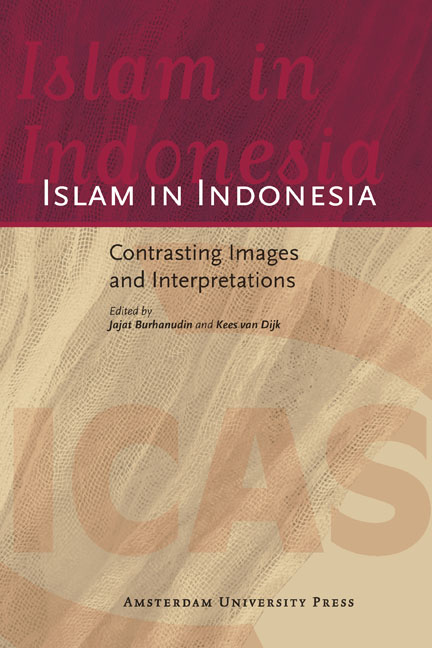Book contents
- Frontmatter
- Contents
- Introduction
- 1 Comparing Different streams of Islam: Wrestling with Words and Definitions
- 2 Defining Indonesian Islam: An Examination of the Construction of the National Islamic Identity of Traditionalist and Modernist Muslims
- 3 Indonesia in the Global Scheme of Islamic Things: Sustaining the Virtuous Circle of Education, Associations and Democracy
- 4 Distinguishing Indonesian Islam: Some Lessons to Learn
- 5 Islam, State and Society in Democratising Indonesia: A Historical Reflection
- 6 The Politics of Piety in the Pondok Pesantren Khusus Waria Al-Fattah Senin-Kamis Yogyakarta: Negotiating the Islamic Religious Embodiment
- 7 The Indonesian Muslim Feminist Reinterpretation of Inheritance
- 8 Managing Familial Issues: Unique Features of Legal Reform in Indonesia
- 9 A new Generation of Feminists within Traditional Islam: An Indonesian Exception
- 10 Religious Pluralism and Contested Religious Authority in Contemporary Indonesian Islam: A. Mustofa Bisri and Emha Ainun Nadjib
- 11 Islam and Humanitarian Affairs: The Middle Class and New Patterns of Social Activism
- 12 Dakwah radio in Surakarta: A Contest for Islamic Identity
- 13 Muslim Fundamentalism in Educational Institutions: A Case Study of Rohani Islam in High Schools in Cirebon
- 14 Majlis Tafsir Al-Qur’an and its Struggle for Islamic Reformism
- Glossary
- About the Editors and Contributors
- Bibliography
- Index
- Monographs
2 - Defining Indonesian Islam: An Examination of the Construction of the National Islamic Identity of Traditionalist and Modernist Muslims
Published online by Cambridge University Press: 09 January 2021
- Frontmatter
- Contents
- Introduction
- 1 Comparing Different streams of Islam: Wrestling with Words and Definitions
- 2 Defining Indonesian Islam: An Examination of the Construction of the National Islamic Identity of Traditionalist and Modernist Muslims
- 3 Indonesia in the Global Scheme of Islamic Things: Sustaining the Virtuous Circle of Education, Associations and Democracy
- 4 Distinguishing Indonesian Islam: Some Lessons to Learn
- 5 Islam, State and Society in Democratising Indonesia: A Historical Reflection
- 6 The Politics of Piety in the Pondok Pesantren Khusus Waria Al-Fattah Senin-Kamis Yogyakarta: Negotiating the Islamic Religious Embodiment
- 7 The Indonesian Muslim Feminist Reinterpretation of Inheritance
- 8 Managing Familial Issues: Unique Features of Legal Reform in Indonesia
- 9 A new Generation of Feminists within Traditional Islam: An Indonesian Exception
- 10 Religious Pluralism and Contested Religious Authority in Contemporary Indonesian Islam: A. Mustofa Bisri and Emha Ainun Nadjib
- 11 Islam and Humanitarian Affairs: The Middle Class and New Patterns of Social Activism
- 12 Dakwah radio in Surakarta: A Contest for Islamic Identity
- 13 Muslim Fundamentalism in Educational Institutions: A Case Study of Rohani Islam in High Schools in Cirebon
- 14 Majlis Tafsir Al-Qur’an and its Struggle for Islamic Reformism
- Glossary
- About the Editors and Contributors
- Bibliography
- Index
- Monographs
Summary
A journalistic report from Newsweek magazine in September 1996 about Islam in Indonesia was entitled ‘Islam with a Smiling Face’. The title is indicative of the image of Islam in the archipelago, which differs from Islam elsewhere in the Muslim world. In general, according to this report, Islam in Indonesia is peaceful, moderate and shows a positive attitude towards democracy, modernity, plurality and human rights. This conclusion is echoed by Azyumardi Azra (2010b), who emphasises that Islam in Indonesia is different from that in the Middle East due to its distinctive traits, such as its tolerance and moderate views, and the fact that it provides a ‘middle way’ (umma wasat) between secularism and Islamism. Such an assessment obviously represents the positive meaning that contemporary accounts give to the distinctiveness of Islam in Indonesia. Although certain Muslims from other parts of the world might object to this claim to exclusivity, the particularity of Islam in Indonesia in general has been recognised by many scholars.
Early American scholarship on Islam in Indonesia was aware of its distinctiveness. However, in contrast to the current connotation, which generally tends to have a positive meaning, these scholars perceived the distinctiveness of Indonesian Islam in a negative way, particularly in comparison to normative Islam and Islam in its heartland. In this context, Indonesian Islam tended to be seen as incomplete or corrupted. Clifford Geertz (1960a), for instance, shows his reluctance to categorise the nominal Muslims in Java, who constitute the majority, as Muslims. Instead of calling Islam in Java ‘Javanese Islam’, he preferred the term ‘religion of Java’, as is reflected in the title of his classic book. Geertz is not alone in perceiving the particularity of Islam in Indonesia in this negative sense. C.L.M. Penders and several other scholars perceive that the majority of Indonesian people could be barely considered Muslims based on the degree of correspondence with High Islam, to follow the terminology used by Ernest Gellner (1981). Penders recalls that in the beginning, the Javanese and peoples in the Indonesian archipelago attached themselves to Islam at only one stage higher than a pro forma. And as it progressed, Islam was never able to replace traditional Javanese civilisation in its totality.
- Type
- Chapter
- Information
- Islam in IndonesiaContrasting Images and Interpretations, pp. 25 - 48Publisher: Amsterdam University PressPrint publication year: 2013
- 2
- Cited by



